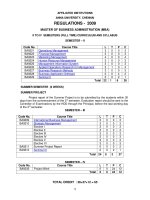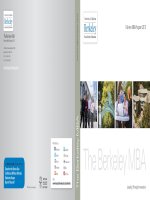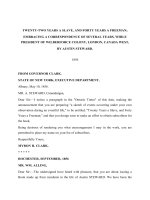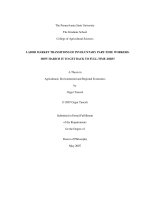MBA (MARKETING) TWO YEARS FULL TIME PROGRAMME
Bạn đang xem bản rút gọn của tài liệu. Xem và tải ngay bản đầy đủ của tài liệu tại đây (346.01 KB, 23 trang )
Faculty of Management
Department of Business Administration
M.J.P. Rohilkhand University
Bareilly – 243 001 (U.P.)
Syllabus
MBA (Marketing) Two Years
Full Time Programme
MBA(Mktg.) -I Semester
Management Concepts
PAPER CODE : MM-101
Objectives : The objective of this course is to develop a basic understanding about the management concepts as well
as of human in various managerial processes in organisation .
UNIT-I
Management : Definition, nature, process , functions & skills . Evolution of management thoughts - F.W. Taylor, Henri
Fayol, Max Weber , Elton Mayo . Management Approachs- System approach , Contingency approach . Business
Organisation - Types of ownership .
UNIT-II
Planning : Concept and purpose , Planning Process , Management by Objectives(MBO), Decision Making .
Organisation : Concept and purpose of organisation , Types of organisation , Line, Line & Staff , Matrix , Virtual
Organisation structures . Basis of Departmentation , Concept of Authority, Functional Authority, Delegation of Authority
, Centralisation and Decentralisation of Authority. Coordination . Staffing .
UNIT-III
Directing : Leadership - Concept , Traits, Styles . Communication : Concept, Types , process, barriers, making
Communication effective .
Controlling : Concept, process, Requirement for Adequate control , Budgetory Control , Non-Budgetory Control .
UNIT-IV
Business Process Re-engineering - Concept , Process, Redesign, BPR experiences in Indian Industry .
Total Quality Management(TQM) - Concept , Systems model of Quality, Deming's approach, TQM as a business
Strategy .
Knowledge Management (KM)- What , why, how, of Knowledge Management , KM process , approach, strategies,
tools.
E-commerce- Ideology, methodology, classification by application /nature of transactions , Driving Forces of EC, Impact
of EC, Scope .
UNIT-V
Functional area of Management - Concept, objectives, scope and principle of Marketing Management, Production
Management, HRM , Finance, Material management
Suggested Readings :
1. Stoner, Freeman , Gilbert Jr. : Management (Pearson education)
2. Kootz,O'Donnell , Weighrich : Essentials of Management
3. Michael , J. Stahl : Management -Total Quality in a global environment ( Blackwell Business)
4. Newman , Warren and Summer : The Process of Management , Concept, Behaviour & Practice .
5. Brech , E.F.L. : Principles and Practice of Management
6. Drucker , P.F. : Managements , Tasks , Responsibilities , Practices
7. Asha Kaul : Effective Business Communication (PHI)
8. RonLudlow, Fergus Panton : The Essence of Effective Communication(PHI)
9. Efrain , jae, david , H. Micheal : Electronic Commerce : A Managerial Perspective (Pearson Education)
10. Carr D.K. and Johansson H.J. - Best Practices in Re-engineering (MGH)
11. Jayaraman M.S.: Business Process Re-engineering (TMG)
MBA(Mkt.)- I Semester
Business Environment
PAPER CODE :MM-102
Objectives : The course aims to educate the student with the different environmental factors which effect business .
This course aims to develop ability to understand and scan business environment in order to analyse the opportunities and
take decisions under the uncertainty .
UNIT-I
Concept, Significance and nature of Business Environment ; Elements of environment - internal and external ;
Different roles of government in relation to business ; Social Responsibilities of Business .
UNIT-II
Broad profile of Indian Economy , Industrial Policy - its historical perspectice(inbrief) , Industrial Policy
Liberalisation .
Economic Planning in India ; Rationale of economic planning , latest five year plan .
UNIT-III
Public sector -its objectives and working , major problems of public sector enterprises ; Privatisation of public
sector enterprises - the issue involved .
Role of Private and Joint Sectors.
Securities Excahnge Board of India - Organisation and Role , Regulation of Mergers and Acquisitions.
UNIT-IV
Competition Act ; Industries Development and Regulation Act ; Consumer Protection Act -its main provisions.
UNIT-V
Latest Export -Import Policy ; Foreign Exchange Management Act ; Globalisation and Business practices,
,WTO- objectives and Role in International trade .
Suggested Readings :
1. Francis Cherunilam : Business Environment
2. K. Ashwathapa : Business Environment
3. Rudra Dutt: Indian Ecnomy
4. Kuchhal S.C. : Industrial Economy of India
5. Ghose P.K. : Government & Industry
MBA(Mktg.) - I Semester
Managerial Economics
PAPER CODE : MM-103
Objectives: The basic objectives of this course is to familiarise the students with the concepts and tools of
managerial Economics as applicable to decisions making in contemporary business environment .
UNIT-I
Nature and scope of Managerial Economics : nature and scope of Managerial Economics , its relationship with
subjects . Objective of Firm, Fundamental Economic concepts- Opportunity cost concept , Incremental concept,
Principle of the perspective , Discounting principle and Equimarginal principle .
UNIT-II
Demand Analysis : Concept and importance of Demand & its determinants , Income & Substitution effect,
Various elasticities of demand , using elasticities in managerial decisions , revenue concepts, relevance of
demand forecasting , methods of demand forecasting .
UNIT-III
Cost Concept and Production Theory : Various cost concepts & classifications, Cost output relationship - in
short run and in long run , (cost curves), Economies of scale , cost control and cost reduction , Production
function , managerial uses of production function , Indifferent curves.
UNIT-IV
Pricing Decisions : Pricing methods , Price Discremenation , Price and output decisions under defferent market
structures - Perfect competition, Monopoly and Monopolistic Competition , Oligopoly .
UNIT-V
Profit & Inflation : Profit, Functions of profit, profit maximisation , Break Even analysis , Inflation - Types, in
terms of demand pull & cost factors , effects of inflation .
Suggested Readings : Managerial Economics
Managerial Economics: Concepts & Cases
1. Varsney & Maheshwari : Managerial Economics
2. Mote, Paul & Gupta Managerial Economics
3. D.N. Dwivedi Managerial Economics
4. D.C. Hague Managerial Economics
5. Peterson & Lewis A study of Managerial Economics
6. Trivedi Managerial Economics
7. D. Gopalkrishan
8. Habib-Ur-Rehman
MBA(Mktg.) - I Semester
Statistical Analysis & Operations Research
PAPER CODE :MM-104
Objectives : The basic aim of this course is to impart knowledge of basic statistical tools & techniques and
operartions research with emphasis on their application in Business decision process and Management.
UNIT-I
Statistics : Concept , Significance and Limitations . Collection of Primary and Secondary Data, Classification
and Tabulation , Frequency Distributions and their graphical representation.
UNIT-II
Measures of Central Tendency : Mean, Median and Mode . Measures of Dispersion : Range, Mean Deviation ,
Standard Deviation and Quartile Deviation . Moments , Measures of Skewness and Kurtosis .
UNIT-III
Sampling : Methods of Sampling ; Sampling and Non-Sampling Errors ; Law of Large Numbers and Central
Limit Theorem (without proof) .
Estimation , Point & Interval Estimates , Confidence Intervals .
Statistical Testing - Hypothesis and Errors ; Large and Small One Sample and Two sample Tests - Z test, t -test
and F-test.
Chi-Square as a test of Independence and as a test of Goodness of Fit ,Analysis of Variance .
UNIT-IV
Linear Programming : Problem formulation, Graphic Method , Simplex Method(including Big M Method) ,
Duality , Transportation and Assignment problems .
UNIT-V
Decision Theory & Games Theory : Decision making under uncertainty - Laplace principle , Maximin or
Minimax principle , Maximax or minimin principle , Hurwicz principle and Savage principle , Drcisions
under risk ; Decision Tree Approach and its applications . Two person zero -sum game , Pure Strategy and
Mixed Strategy
Suggested Readings :
1. Levin , R.I. & Rubin , D.S.: Statistics for Management(PHI)
2. Gupta , S.P. & Gupta , M.P. : Business Statistics
3. Levin , R.I. : Quantitative Techniques
4. Sharma , J.K : Operations Research : Theory and Applications
MBA(MKT) - I Semester
Financial and Cost Accounting
PAPER CODE :MM-105
Objectives : The basic purpose of this course is to develop an insight of postulates , principles and
technique of accounting and Cost accounting as well to provide students the basic fundamentals of accounting .
UNIT- I
Financial Accounting - Nature and objectives, Accounting Principles , Accounting Equations, Accounting
Standards, Capital and Revenue receipts & payments , Depreciation methods and accounting .
UNIT-II
Origin and Analysis of Business Transactions - Types of Accounts , Journal , Ledger and Trail Balance ,
Inventory Valuation techniques and accounting .
UNIT-III
Financial Statements of Trading Organisation - Preparation with adjustments , Final Accounts of Limited
Liability companies - P/L Account , P/L Appropration Account, Balance Sheet .
UNIT-IV
Cost classification , Analysis and Behaviour- Classification of Cost on different basis and Technique for
separation of Costs . Product - Costing , Unit Costing ,Job Costing and Process Costing .
UNIT-V
Full Costing , Reconciliation and integration between financial and Cost accounting .
Suggested Readings :
1. Horngren , Charles etc. - Principles of Financial & Management Accounting , Eaglewood Cliffs , New Jersy
, PHI.
2. Needles Beleved etc. - Financial and Management Accounting , Boston , Houghton Miffin Co.
3. Bhattacharya - Financial Accounting , PHI .
4. Ravi M . Mohan - Financial Accounting , Taxamann , New Delhi.
5. Vj. madhu - Financial and Management Accounting , Anmol Publications , New Delhi .
Paper Setting Guidelines
UNIT-I - One Numerical and one theoretical .
UNIT-II -- One Numerical and one theoretical .
UNIT-III - One Numerical Question Compulsory .
UNIT IV- Two Numerical Questions
UNIT V - Two Numerical Questions
MBA(Mktg.)- I Semester
Marketing Management
PAPER CODE :MM-106
Objective
The objective of this course is to facilitate understanding of the conceptual framework of marketing and its
applications in decision making under various environmental constraints.
UNIT-I
Introduction: Concept, nature, scope and importance of marketing; Marketing concept and its evolution;
Marketing mix; Strategic marketing planning – an overview.
Market Analysis and Selection: Marketing environment – macro and micro components and their impact
on marketing decisions; Market segmentation and positioning; Buyer behavior; consumer versus
organizational buyers; Consumer decision making process.
UNIT-II
Product Decisions: Concept of a product; Classification of products; Major product decisions; Product
line and product mix; Branding; Packaging and labeling; Product life cycle – strategic implications;
New product development and consumer adoption process.
Pricing Decisions: Factors affecting price determination; Pricing policies and strategies; Discounts
and rebates.
UNIT-III
Distribution Channels and Physical Distribution Decisions: Nature, functions, and types of
distribution channels; Distribution channel intermediaries; Channel management decisions; Retailing
and wholesaling.
Promotion Decisions: Communication Process; Promotion mix – advertising, personal selling,
sales promotion, publicity and public relations; Determining advertising budget; Copy
designing and testing; Media selection; Advertising effectiveness; Sales promotion – tools
and techniques.
UNIT-IV
Marketing Research: Meaning and scope of marketing research; Marketing research process.
Marketing Organisation and Control: Organising and controlling marketing operations.
UNIT-V
Issues and Developments in Marketing: Social, ethical and legal aspects of marketing;
Marketing of services; International marketing; Green marketing; Cyber marketing;
Relationship marketing and other developments of marketing.
Suggested Readings :
1. Kotlar, Philip, Marketing Management, Prentice Hall, New Delhi.
2. Stanton, Etzel, Walker, Fundamentals of Marketing, Tata-McGraw Hill, New Delhi.
3. Saxena, Rajan, Marketing Management, Tata-McGraw Hill, New Delhi.
4. McCarthy, E.J., Basic Marketing: A managerial approach, Irwin, New York.
MBA(Mktg.) - I Semester
Financial Management
PAPER CODE :MM-107
Objectives: The objectives of develop a conceptual frame work of finance function and to
acquaint the participants with the tools techniques and process of financial management in the realm
of financial decision making .
UNIT-I
Introduction - nature concept of finance function . Distiction between Accounting and Finance
function . Objectives of Financial Management - Profitability vs wealth Maximisation .
Organisation for Finance Function . Time value of money valuation concept , compound value
concept , Present value concept . Financial Planning and Financial Forecasting.
UNIT-II
Capital Structure Planning- Patterns of financial requirement , Objectives of an optimum capital
structure, Security Mix, Capitalisation concept . Causes. Consequences and Remidies of over
capitalisation and under capitalisation . Capital structure theories (with numerical problems) . Sources
of ling term finance-shares and Debentures . New financial Instruments and Institutions Leverage
Analysis.
UNIT-III
Management of Fixed Capital - Concept, relevance and compution of cost of capital nature and
Scope of Capital Budgeting , Capital Budgeting , Analysis of risk and Uncertainty (with numerical
problems).
UNIT-IV
Management of Working Capital - Concepts of working capital, Nature and Scope of Working
Capital Management, Approaches to the Financing of Current Assets determining the financing mix ,
Financing of working capital in India . Estimation of working capital (with numerical problem) .
UNIT-V
Management of Earnings- Nature and scope of management of earnings , Dividend Policy and
Dividend Models , Waltor's Model , Gordon's Model , MM Hypothesis, Pattern of dividend
policies (with numerical problems). Determinants of Dividend Policy .
Suggested Readings :
1. Brigham : Financial Management Theory and Practice
2. Horne, Wachowiez , Jr. : Fundamentals of : Financial Management
3. Westorn and Brigham : Managerial Finance
4. Van-Horne : : Financial Management and Policy
5. I.M. Pandey : : Financial Management
6. S.N. Maheshwari : : Financial Management
MBA(Mktg.)- II Semester
Accounting for Managerial Decisions
PAPER CODE :MM-201
Objective
The objectives of the course is to give exposure to the students , about accounting techniques and their
application in the planning and decision making process .
UNIT- I
Accounting for Management - Nature and scope , Role of Management Accountant , Differences in the
financial accounting . Strategic Management .
Accounting - Major competitive forces influencing business strategy . Factors affecting strategic Decision
making . Strategic management Accounting and Competitive Position .
UNIT -II
Activity based Costing - Kaplan & Cooper's approach to ABC - How to develop ABC system , How ABC
system supports corporate strategy . Analysis of Financial Statements Ratio Analysis - Profitability , Turnover
and Solvency Ratios , Funds Flow and cash flow analysis.
UNIT -III
Marginal Costing and its practical applications in Managerial decisions . BEP analysis , P/V Ratio and their
applications in solutions to business problems , Life Cycle Costing
UNIT-IV
Budgeting and Budgeting Control - Flexible Budget and cash Budget , Capital Budgeting - Pay Back Method ,
NPV,IRR and ARR techniques and their practical applications in decision making process .
UNIT -V
Variance Analysis - material and labour variances . Marketing and Distribution cost Analysis - Techniques of
Management Accounting in Marketing and Physical Distribution Market Segmentation. Transfer Pricing
Techniques - Multinational transfer Pricing etc.
Suggested Readings :
1. Anthony R N and Reece JS. Accounting Principles , Hoomwood illinos , Richard D. Irvin
2. Bhattacharya SK and Dearden J. - Accounting for Management . Text and Cases , New Delhi.
3. Hingorani NL and ramanthan AR - Management Accounting , New Delhi
4. Ravi M. Kishore , Advanced management Accounting , Taxmann , NewDelhi
5. Maheshwari SN - Management and Cost Accounting , Sultan Chand , New Delhi
6. Gupta , SP - Management Accounting , Sahitya Bhawan , Agra .
Paper Setting Guidelines
UNIT-I - Two theoretical questions .
UNIT-II -- Two Numerical Questions .
UNIT-III Two Numerical Questions
UNIT IV- Two Numerical Questions
UNIT V - One Numerical and one theoretical Question
MBA(Mktg.)- II Semester
Computer Application -I
PAPER CODE :MM-202
Objective
The objectives of this course is to provide an understanding Computers , Computer operating system and
application of relevant softwares in managerial decisions making.
UNIT-I
Introduction of Computers : Organisation, Characteristics, Types of Computers , Types of memories ,
Number systems ( Binary, Octel, Hexadecimal) . Hardware & Software concepts,
UNIT-II
Operating System : Introduction of OS, Types of OS, Functions of OS, MSDOS Internal Commands : chdir,
cls, path, prompt, label , ver, vol, echo, set . External Commands : scandisk, discopy , diskcomp , format,
backup, restore . Windows - Windows explorer, print manager, control panel, paint brush . Dialog box: text
box, check box, slide boxes, Desktop .
UNIT-III
MS-Office(Word & Excel) : Introduction of Word Processing, MSWord: Creating, Editing , printing, page
formating , sorting and tables , Mail Merge . MSExcel: Introduction to spreadsheet, creating, formating
,printing , Graphs of worksheets.
UNIT-IV
Programming Logic & Techniques : Algorithm , Flow Charting : Flow Chart Symbols, Advantages &
disadvantages of Flow Chart . Pseudocode , Program, Designing a Program , Computer languages.
UNIT-V
Data Communication & Networks: data Communication Concept, Medias, Modes . Multiplexers,
Networtking : Needs, types of network. Distributed Processing, Client - Server Concepts , OSI Models.
Suggested Readings :
1. Summer ,M. : Computers Concepts and Uses , Englewood Cliffs, New Jersey , PHI
2. V. Rajaraman : Fundamental of Computers
1. Peter Norton : Introduction to MS-DOS
2. O.Brian, J.A. : MIS , TMH
3. Computer Networks : Tannenbaum
MBA(Mktg.)- II Semester
Sales Management
PAPER CODE :MM-203
Objective
The objectives of this course is to provide an extensive picture with regards to theory and practice of managing
sales and to inculcate personal selling skills.
Unit- I
Sales Management and Organisation :
Objectives and sales management , sales executive as a coordinator , sales management and control , sales
organisation - it's purpose , setting up a sales organisation , types of sales organisation .
Unit -II
Personal Selling :
Objectives and theories of personal selling , analysing market potential, sales potential and sales forecasting
method & evaluation , determining sales related marketing policies - product policies, distribution policies &
pricing policies .
Unit- III
Sales Operations:
Sales budget , sales territories , sales Quata's , control of sales , sales meeting and sales contest, organising
display , showroom and exihibitions.
Unit- IV
Salesmanship:
Sales manager- Qualities and functions , types of salesman , prospecting , pre-approach & approach , selling
sequence , psychology of customers .
Unit-V
Sales force Management:
Recruitment & selection , training , formulation & conduction of sales training programme, motivation of sales
personnel , compensation of sales personnel , evaluation and supervision of sales personnel .
Suggested Readings : Sales management & Cases
How to build a dynamic Sales Organisation
1. Still , Cundiff & Govani Elements of Salesmanship and Publicity
2. McMurry & Arnold Professional Sales Management
3. Pradhan , Jakate & Mali Successful Selling
4. Anderson R
5. F.L. Lobo
MBA(Mktg.)- II Semester
Consumer Behaviour
PAPER CODE :MM-204
Objective:The basic objective of this course is to develop an understanding about the consumer decision
making process and its applications in marketing function of firms.
Unit-I
Introduction to Consumer Behaviour(CB): Nature and Importance of CB, application of CB in Marketing ,
Consumer Research process.
Unit-II
Individual Determinants of CB:
· Perception: process, Consumer Imagery, perceived risk
· Learning: principles, theories
· Personality: nature, theories, self concept, psychographic and life style
· Attitude: Structural model of attitude, attitude formation & change
· Motivation: needs/motives & goals, dynamic nature of motivation, Arousal of motives, theories
Unit-III
Group Determinants of CB:
· Reference group influence: types of consumer relevant groups, factors affecting group influence,
application of reference group concept.
· Family: functions of family, family decision making, family life cycle(FLC)
· Opinion Leadership and Personal influence
· Diffusion of Innovation: Adoption process., Diffusion process
Unit- IV
Environmental Influences on CB:
· Social class, Life style Profile of Social class, application to CB
· Culture: characteristics, cross cultural understanding
Unit-V
Consumer Decision making Process:
· Problem recognition
· Information Search Process and Evaluation
· Purchasing process
· Post purchase behaviour
· Models of CB- Nicosia, Howard & Sheth, Engel-Kollat Blackwell
Suggested Readings :
1.Loudan, David L and Bitta, A.J. Della Consumer Behaviour
2. Schiffman LG and Kanuk LL Consumer Behaviour
3. Nair, Suja R, Consumer Behaviour in Indian Perspective
4. Bennet and Kasarjian Consumer Behaviour
5. Mowen, John Consumer Behaviour
MBA(Mktg.)- II Semester
Agricultural and Rural Marketing
PAPER CODE: MM-205
Objective
The objective of this course is to explore the students to the Agriculture and Rural Marketing environment so
that they can understand consumer's and marketing characteristics of the same for understanding and
contributing to the emerging challenges in the upcoming global economic scenario.
Unit-I
Concept & scope of rural market, Rural development as a core area, Efforts put for Rural development in Five
years plans. Rural markets’ Characteristics, Rural markets. Environmental factors.
Unit-II
Rural Consumer Behaviour, Rural Consumer Vs Urban Consumers – a comparison, Relevance of Marketing
mix for Rural market/Consumers. Problems in rural market
Unit-III
Segmentation, Targeting & Positioning for rural market, Market forces, components of different Product
Strategies, Pricing Strategies, Promotional Strategies & Distribution Strategies for Rural consumers.
Unit-IV
Understanding Agricultural Markets, Nature & scope, Objectives of Agriculture Marketing, Challenges in
Agriculture Marketing, Agriculture Marketing & its Economic importance, Agricultural Produces and their
market.
Unit-V
Export potential for agri-products, Major of Government and Non-Govt. Agencies in the development of Rural
and Agricultural, Sector Marketing Strategies for Seed; Fertilizers; Pesticides; Farm equipment. Role.
Suggested Readings:
1. Badi & Badi : Rural Marketing
2. Mamoria, C.B. & Badri Vishal : Agriculture problems in India
3. Arora, R.C. : Integrated Rural Development
4. Rajgopal : Managing Rural Business
5. Gopalaswamy, T.P. : Rural Marketing
6. Agriculture Today Magazine
MBA(Mktg.)- II Semester
Marketing Research
PAPER CODE :MM-206
Objective
The course is designed to inculcate the analytical abilities and research skills among the students.
Unit-I
Marketing Research: Introduction, Management uses of marketing research, Problem Formulation & steps in
decision Making Process.
Unit-II
Research Design: Introduction, Exploratory Research, Descriptive research, Causal/ Experimental Research
Design, Relationship in between different types of designs.
Unit-III
Data Collection Methods, Primary & Secondary Data, Observation & Questionnaire Techniques, Analysis &
interpretation of Data, Development of questionnaire.
Unit-IV
Sample Design, Sample Plan, Probability & Non- Probability Sampling, Sample Size, etc., Attitude
Measurement through different types of scales.
Unit-V
Product Research, Advertising Research – Copy Testing – Test Marketing, Media Selection, Research Report
Suggested Readings:
1. Research for Marketing Decisions Paul E. Green, Donald S. Tull
2. Marketing Research- Text and Cases Harper W. Boyd Jr. , Ralph Westfall
MBA(Mktg.)- II Semester
Advertising Management
PAPER CODE :MM-207
Objective
The aim of the paper is to acquaint the students with concepts, techniques and give experience in the application
of concepts for developing an effective advertising programme.
Unit-I
Advertising, Its role in the marketing process; Legal, Ethical and Social aspects of advertising.
Communication - processes of communication; integrated marketing communications, Its evolution, reasons for
its growth and its role in branding.
Unit-II
The promotional mix; segmentation, Targetting and positioning and their role in promotion.
Promotional objectives, determination, types and approaches, DAGMAR approach, problems in setting
objectives; Advertising budget, establishment and allocation, budgeting approaches.
Unit-III
Advertisement copy, Its components and types; The importance of creativity in advertising, creative strategy
and process, implementation and evaluation.
Unit-IV
Media Planning, Establishing Media objectives, Media strategies, Media mix, Reach Vs. Frequency, Creative
aspects, budget considerations, Evaluation of Broadcast media, Print media, Support media, Internet and
interactive media etc.; computers in Media planning.
Unit-V
Measuring the effectiveness of the promotional program, Advertising Research, Market testing, Testing via
internet, Pre testing, Post testing, Laboratory Tests, Field tests, PACT (Positioning Advertising Copy Testing).
Suggested Readings :
1. Aaker, David A. etc., Advertising Management, 4th edition , PHI, 1985
2. Belch, George E. and Belch, Michael A.; Advertising and promotion, Tata McGraw Hill, New Delhi
3. Ogilvy David, Ogilvy on Advertising, London, Longman.
4. Jones, John Philip, What’s in a brand, Tata McGraw Hill, New Delhi
5. Chunawalla, S.A., Advertising, Sales and Promotion Management, Himalaya Publishing House, Mumbai.
6. Mohan, Manendra; Advertising Management, Tata McGraw Hill, New Delhi
7. Sandage and Fry burger, Advertising Management
MBA(Mktg)-III Semester
Corporate Strategy
PAPER CODE :MM-301
Objectives: This course deals with corporate level Policy & Strategy formulation areas. This course aims to
developing conceptual skills in this area as well as their application in the corporate world.
UNIT-I
Business Policy as a study ; Its Nature & Importance , Development & Classification of Business Policy; Mechanism or
Policy making.
UNIT-II
Top Management its Responsibilities & tasks .
Objectives of Business Characteristics, Classification , types of Objectives and their overall Hierarchy , Setting of
Objectives , Key areas involved.
UNIT-III
Corporate Planning ; Concept of long term planning , Strategic Planning (Planning Strtegically ) , Nature , Process &
Impotance .
UNIT-IV
Corporate Strategy : Concept , Components , Importance.
Strategy Formulation : Concept , Process & Affecting Factors.
Strategy Evaluation: Process , Criteria , Environmental Analysis , Resourse Analysis .
UNIT-V
Synergy : Concept , Types , evaluation of Synergy.
Capability Profiles , Synergy as a Component of Strategy & its Relevance .
Suggested Readings :
1. Peter F. Drucker Management Task & Resposibiliies
2. Igor Ansoff Corporate Strategy
3. Gluek & Jaunch Corporate Strategy
4. Standard Management Policy
5. McCarthy, MiniChiello, Curran Business Policy & Strategy
MBA(Mktg.)- III Semester
RETAILING
PAPER CODE :MM-302
Objectives: The course enables students to appreciate the importance of retailing and distribution in the
emerging market scenario, and equips them with the tools & techniques.
UNIT-I
Marketing Channels & Supply Chains:Emergence , role and types of marketing channels , channel members
and their characteristics , choosing various channel options , factors affecting the choice .
Supply chain management (SCM) - advantages gained, physical flow of merchandise, logistics of e-retailing.
UNIT-II
Retailing:Nature and Importance of retailing, wheel of retailer, Types of retailing- ownership based, store
based, non-store based, web based. Retail management decisions, Recent Trends in retailing.
UNIT-III
Strategic Planning in Retailing:Situation analysis, objectives, identification of consumers and positioning,
overall strategy , specific activities and control.
Identifying & understanding consumer – Consumer demographics & life styles, consumer needs & desires,
consumer shopping attitude, consumer decision process, retailers action.
UNIT-IV
Location , Operation & Merchandise Management :Trading Area Analysis, site selection, store formation size
and space allocation, store security and credit management.
Merchandise plans- forecasts, innovativeness, assortment decisions, brand decisions, timing and allocation,
merchandise pricing.
UNIT-V
Retail Promotion:Building retail store image, atmosphere, layout planning, Retail promotional mix strategy,
Retail store sales promotional schemes.
Suggested Readings : Retail Management
Strategy planning in Logistics and
1. Berman , Barry and Joel Evans Transportation
2. Cooper, J. Retail Management
Retailing Management
3. Cox, Roger and Paul Brittain Marketing Management
4. Levy & Weitz
5. Kotter , Philip
MBA(Mktg.)- III Semester
Entrepreneurship Development
PAPER CODE :MM-303
Unit I
Conceptual Framework of Entrepreneurship: Entrepreneur and Entrepreneurship - Concept, Definition, Role
and Importance in Indian Economy, Theories of Entrepreneurship, Entrepreneurial Traits and Motivation ,
Entrepreneurs Vs Professional Managers, Future challenges.
Unit II
Entrepreneurial Development: Entrepreneurial Environment – Meaning, Private Enterprise and Development,
Significance of Entrepreneurial Development Programmes, Meaning Evolution and Objectives of EDP,
Institutional efforts to develop Entrepreneurship, Operational Problem of EDPs
Unit III
Project Management:Search for Business idea, Concepts of Projects and Classification, Project Identification,
Project formulation, Project Design and Network Analysis, Project Report, Project Appraisal, Factory design
and Plant Layout, Financial Analysis- Risk and Return
Unit IV
Finance and Marketing:Finance : Sources of Development Finance, Project Financing Institutions- Financial
Institutions, Consultancy, Organisations.
Marketing: Methods, Channel of Marketing, Marketing Institutions and Assistance.
Unit V
Small Industry Setup:Considerations in Selection of Particular Form of Organisations- Sole proprietorship,
Partnership, Joint Stock Company, Cooperative Organisations- Their Merits, Limitations, Suitability, Brief
Procedure of Incorporation. :Location for a Small Industry, Steps of Starting a small Industry, Incentives and
Subsidies, Exploring Export Possibilities, Problems of Entrepreneurship.
Suggested Readings :
Dynamics of Entrepreneurial Development Management
Vasant Desai, Himalaya Publishing House.
Entrepreneurial Development
S.S. Khanna
Entrepreneurship & Small Business Management
CL Bansal, Haranand Publication
Entrepreneurial Development in India
Sami Uddin, Mittal Publication
Entrepreneur Vs Entrepreneurship- Human Diagnosis of Development Banking
Nagendra P. Singh, Asian society for Enterpreneurship Education and development
MBA(Mktg.) - III Sem.
SERVICE MARKETING & CRM
PAPER CODE :MM-304
Objective :
The objective of the course is to deveelop an understanding of services and sevice marketing with emphasis on
various aspects of service marketing which make it different from goods marketing.
UNIT-I
Nature & Scope: Concept of services , importance, Goods & Services marketing, Emergence & Reasons for
growth of service sector in India, Characterstics of services, Classifications of services, Environment of
Service Marketing ( Micro as well as Macro).
UNIT-II
Understanding Customers: Concept of CRM, Relationship management in practice, .
Segmenting ,Targeting & Positioning various services.
UNIT-III
Product, Product differentiation, product levels
Pricing of services- pricing concepts,pricing strategies for services, use of differential pricing.
Place-Service distribution, components of service delivery system, potential management, problems assotiated
with services delivery.
UNIT-IV
Promotion- Advertising, Sales Promotion & Personal Selling in service industry.
People- Importance of people in service marketing. role of various people involved.
Physical Evidence-concept of Physical Evidence, importance, types of Physical Evidence in various services
Process-concept, types of process, Role of process in various services
UNIT-V
Service Models- Service quality Gap Model,, Gronross Model of service quality (Internal marketing, external
marketing and Interactive marketing).
Challenges in Marketing of services
Application of Service Marketing to Hospitals, Educational Institutions, Tourism Industry.
Suggested Readings :
1. Sinha : Services marketing
2. Jha : Services marketing
MBA(Mktg.)- III Semester
E-Commerce
PAPER CODE :MM-305
Objectives: The basic purpose of this paper is to familiarize the students with the preliminary aspects of e-
commerce. So that they may have an overall views while applying the concept of this subject.
UNIT-I
E-Commerce: Introduction, meaning and concept; Needs and advantages of e-commerce; Electronic commerce
vs Traditional commerce; Challenges of e-commerce.
UNIT-II
Internet: Concept & evaluation, Features of Internet: email, WWW, ftp, telnet, newsgroup & video
conferencing; Intranet & Extranet, ISDN, TCP/IP, Limitation of internet, Hardware & software requirement of
Internet.
UNIT-III
Electronic Payment Systems: E-Cash, e-cheque, credit cards, debit cards, smart cards; E-Banking,
Manufacturing information systems; Financial information systems; Human resource information system.
UNIT-IV
E-Marketing: Business to Business (B2B), Business to customer (B2C) e-commerce; Online Sales force, On
line Service and Support; EDI: Functions & components.
UNIT-V
Legal Aspects of e-commerce, Security issues of e-commerce: Firewall, E-locking, Encryption; Cyber laws –
aims and salient provisions; Cyber laws in India and their limitations.
Suggested Readings : Business on the Net : What’s and How’s
of E-Commerce , McMillan
1. Agarwala , K.N. and D. Agarwala Ravi Kalkota , TMH
Management Information System, TMH
2. Frontiers of E-Commerce E-Security and You , TMH
3. O,Brien J. The complete reference to Internet, TMH
4. Oberoi , Sundeep
5. Young , Margret Levine
MBA - (Mktg.) - III Sem.
PRODUCT & BRAND MANAGEMENT
PAPER CODE :MM-306
Unit I
Introduction to Product & Brand Management, Emergence as a separate area of study, Product, Product Levels,
Product Hierarchy,Classification of Product.
Unit II
Product Mix - A strategic choice. Product Mix decisions, Product Line decision - strategic decision involving
adding or pruning product lines.
Unit III
Concept of STP & strategies, Product Positioning, Developing Positioning Strategy, Elements of
Positioning, Positioning Methods, Communicating the Positioning Strategy.
Unit IV
Product Research - Importance, tools and analysis, Product Development & Testing, Product Launch
Decisions. .
Unit V
Branding, Need for Branding, Brand & related concepts: Brand Equity, Brand Life Cycle, Brand Positioning
& Repositioning, Branding decisions, Family vs. individual Branding, Multiple branding, brand extension,
Branding in specific sectors like Industrial, retail, service,e-branding.
Suggested Readings :
Product Management: Ramanujam
Product Management: Chunawalla
Product Management: Lehmann DR; Russel S Winner
Brand Management: Y L R Moorthi
Brand Positioning: Subratu Sen Gupta
MBA(Mktg.)- III Semester
International Business
PAPER CODE :MM-307
Objective
This course exposes the student to the environmental dynamics of international business and its impact on
international business operations of a firm .
Unit I
Concept ; Domestic to Transnational Business ; Driving and Restraining Forces ; Characterstics and role of
MNCs.
Advantages and Disadvantages of Free trade ; The case for protection ; Forms of Restriction ; Effects of
protection.
Unit II
Classical trade theory ; Theory of comparative costs in terms of money ; Evaluation of comarative costs theory ;
General Equilibrium Approach ; Hebkscher-Ohlin Factor – Price Equalisation theory ; Influence of factor
mobility on volume of trade ; country similarity theory
Gains and terms of trade ; Balance of trade and Balance of payments.
Unit III
International business environment – The economic environment ; social and cultural environment, political,
legal and regulatory environment, natural environment. Technological environment .
Unit IV
International Institution Systems – IMF, World Bank and WTO(all in brief), / Regional economic integration;
impact of integration; European Union; NAFTA;ASEAN; SAARC
Unit V
Strategy of International Business – Strategy, planning, organisational structure and process of control. Recent
developments in international business.
Suggested Readings :
1 Cherunilam, Francis – International Business(PHI)
2 Misra, S. & Yadav, P.K. – International Business(PHI)
3 Aswathapa, K – International Business (Tata McGraw Hill )
4 Sharan, Vyuptakesh – International Business (Pearson Education
5 Varshney R.L. and Bhattacharya ,B– International Marketing Management (Sultan Chand & Sons)
MBA(Mktg.) – IV Semester
Strategic Management
PAPER CODE :MM-401
Objectives: This is the second course on this subject . Here the focus is to critically examine the management of the
entire enterprise from the Top Management view points.
Unit-I
Strategic Management –Its Nature and Importance, Skills , Knowledge and Attitudes, Group aspects of Strategic
Management , Characteristics of Business Policy and Corporate Strategy, Norms of Strategy Making , Organizational
Mission, Corporate Objectives and goods, Analysis of Internal Resources , Strength and weaknesses, Strategic advantage
analysis- Factors of common concern, Marketing and distribution , financing and Accounting , Production and operations
management , R&D, Human Resources and other organizational factor, sources of data for internal analysis and
diagnosis.
Unit-II
Growth or expansion strategy – Diversification strategy, Types-Horizontal , Concertric, Conglonerrate, Vertical , various
types of integrations, Retreachment strategy and its variants: External Growth Strategy – Merger, Acquisition and Joint
Ventures.
Unit-III
Functional Policies –Production Policies, Involvement , Interration and choice with respect to production process action
activities , Govt. Policies , backward areas and plant locations consideration in India. Maintenance and replacement
facilities : Purchasing Policies-Make or buy decisions , criteria for vender selection . Co-ordination of Purchase and
production with sales.
Unit-IV
Marketing Strategies and Policies marketing Decision, Variable and Policy issues, product line and product mix policy ,
PLC, Product Positioning Strategy and Market recommendation , customer and channel Policies, Pricing Policies ,
Propotional Policies, Optional Marketing Mix.
Unit-V
Financial Strategies- Financial Policy Issues , Sources of finance control of capital issues , Types of securities . Financial
leverage, Investment and capital allocation policy , capital budgeting , dividend policy, Personnel policies and their
significance recruitment , Industrial relations policy, Settlement of Disputs.
Suggested Readings :
1. P.K. Ghosh : Business Policy , Strategy , Planning and Management
2. Christensen , Andrews Dower: Business Policy- Text and Cases
3. William F. Gkycj : Business Policy – Strategy Formation and Management Action
4. Bongee and Colonan : Concept of Corporate Strategy
5. Peter F. Drucker : Management Tasks, Responsibilities , Practices
MBA (Mktg) - IV Sem.
MARKETING OF NON-PROFIT ORGANIZATION
PAPER CODE :MM - 402
Objectives :
The course aims at familiarising the students with the application of the concept & need of marketing in Non-
Profit organisation.
Unit - I
Introduction: Non Profit Organisation, Concept, Non Profit Organisation in India, types, problems.
Characteristics, Need of Marketing of Non Profit Organisation.
Unit - II
Differentiation of NPOs: Concept of Responsive Organisation- Image management, image causation, image
modification, Mission, Exchange, Environment affecting operations of NPOs(Publics), Image & Satisfaction
measurement.
Unit - III
Managing Marketing efforts:
Understanding Consumer.
Product, Product Mix, Product Mix decisions for Non-profit Organisation
Pricing for Non Profit organistions.
Unit - IV
Market Segmentation for Non profit organisation , Target Marketing
Promotion: Advertising, personal selling, sales promotion and Public Relations for Non profit Organisation.
Unit - V
Managing Human Resource: Attracting People, Analysing people, Recruitment, Members and membership
criterion, Volunteers.
Managing Financial Resource: Donor Marketing, Attracting Funds, Analysing Donor markets, Fund raising-
goals and strategy.
Suggested Readings :
1. Philip Kotler : Marketing of Non-Profit Organisations.
Strategic marketing for NPOs
2. Andreasen Alan R : Social Marketing
3. Roberto Eduado L :
MBA (Mktg) - IV Sem.
INTERNATIONAL MARKETING MANAGEMENT
PAPER CODE :MM - 403
Objectives :
Due to ever increasing business dealings the subject of International Marketing has gained utmost importance in
recent times. The world these days, indeed has shrunk and foreign markets have particularly become important
specially for a developing country like India. The major objective of this course is to provide an exposure to the
area of Marketing in the International perspective.
Unit- I
Introduction to International Marketing, Nature, scope and different complexities of International Marketing,
International Marketing Environment, Basis of International Trade, India and World Trade,
Unit - II
Balance of Trade, Balance of Payments and Instruments of Trade Policy, Devaluation, Revaluation,
Appreciation & Depreciation, Export documents and procedure..
Unit - III
Concept of Free Trade and Regional Economic Groupings, Selection of Global Markets, Segmentation and
Positioning, Product Planning, International PLC, Developing international Pricing Policies and Strategies for
Export.
Unit - IV
Market Entry and overseas distribution system, Overseas Market Research, Marketing Plan for Exports
Multinationals and their role in International Marketing.
Unit - V
Management of Risks in international marketing, Instruments of Financial Transactions in international
marketing, New Techniques ( Joint Ventures, Sub Contracting & BOP) in international marketing.
Suggested Readings :
1. Varshney and Bhattacharya : International Marketing management.
International Marketing.
2. Philip B. Cateora nad John M. Hess : Handbook of International Marketing.
International Marketing
3. Alexender C. Stanley : International Marketing
Marketing Management
4. John Fayerwearther :
5. David Carson :
6. Philip Kotler :
MBA(Mktg.) – IV Semester
Computer Application - II
PAPER CODE : MM-404
Objectives : This course aims at familiarizing students with the environment conducive for web page design and
developing programming skills thereof web publishing.
Unit-I
Internet : Introduction to Internet, WWW, web browsers: IE & Netscape Navigator, web server; HTTP and concepts of
URL, Hypertext and Hyperlink, Web’s Languages and protocols.
Unit-II
Design Web Site: Needs of web sites, Home page and web page, components of web site, objectives of web site,
planning your web site;
Web server: Loading a web server, setting your own web server.
Unit-III
HTML: Basics of HTML, linking HTML pages , linking to URLs; Creating a web pages: Text formatting, alignment,
colors, preformatted text; Adding imaged and background to HTML pages.
Tables, Frames: Introduction of frames, creating frame, frames attributes and Linking .
Unit-IV
DHTML and Style Sheets: Introduction to DHTML , Cascading Style Sheet: Adding style in document- Linking to a
style sheet . Style sheet properties: Font, text, box, color and background properties.
Unit-V
Search Engines and Internet Security: Concept and technology of search engines, popular search engines, overview of
internet security threats, Firewalls.
Suggested Readings :
1. Comer Douglas : The Internet Book –PHI, New York
2. Leon, Alexis and Mathews Leon : Internet for Everyone
3. Xavier : World Wide Web Design with HTML , PHI , Delhi
MBA(Mkt)-IV Sem
Logistics and Supply Chain Management
PAPER CODE :MM-405









